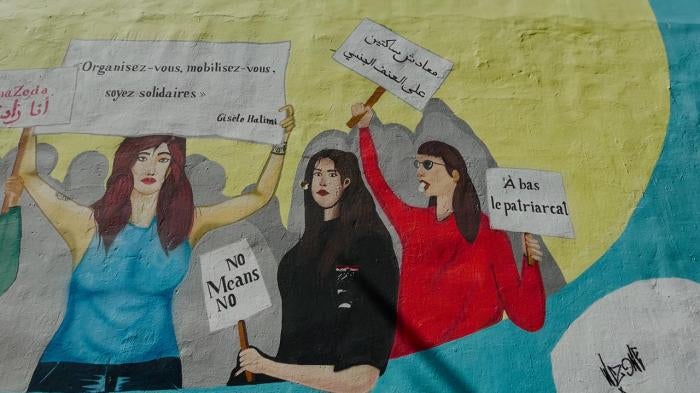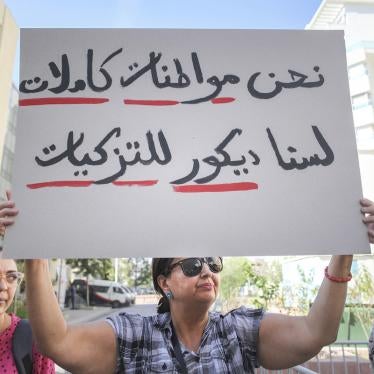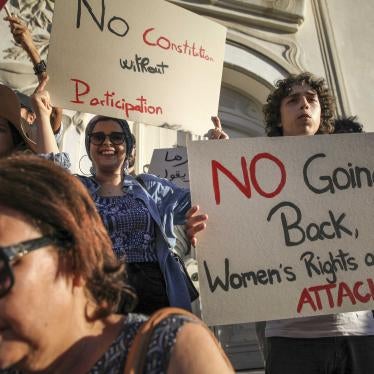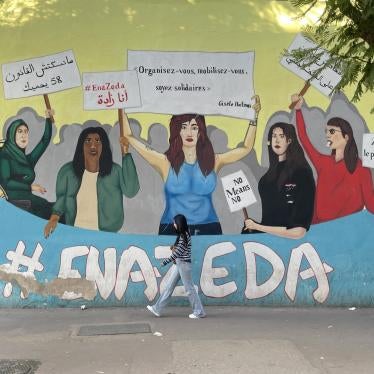(Tunis) – Tunisian authorities are failing to protect women from domestic violence despite enacting a strong law in 2017, Human Rights Watch said in a report published today.
The 94-page report, “So What If He Hit You?: Addressing Domestic Violence in Tunisia,” found that despite the commitment of some officials and one of the strongest laws against domestic violence in the Middle East and North Africa, poor implementation of the law leaves women at risk of violence. The authorities fail to systematically respond, investigate, and provide protection to women who report violence, and a lack of funding for support services, such as shelter, has left many survivors with nowhere to escape.
“The adoption of Law-58 was an important and long-fought achievement to combat violence against women in Tunisia,” said Kenza Ben Azouz, Finberg fellow at Human Rights Watch and author of the report. “Five years on, however, many women continue to face severe abuse by their spouses and other family members and are denied the protections and assistance owed to them from the authorities.”
In 2021 and 2022, Human Rights Watch interviewed more than 100 people across Tunisia, including 30 survivors of domestic abuse, police officers, lawyers, judges, and service providers about the Tunisian authorities’ response to domestic violence.
“I feel like I am walking toward my own death,” said a 40-year-old survivor, who said the authorities refused to help her after her husband beat her with a brick.
Human Rights Watch found that most Tunisian women, especially if they live in the countryside or are illiterate, are unaware of the measures and services available to protect them from violence under Law-58. This is due, in part, to inadequate public information campaigns and signage.
Women are entitled under Law-58 to apply for temporary protection measures that the police can request from prosecutors, as well as longer-term protection orders that courts can issue without the survivor needing to file a criminal complaint or file for divorce. This permits the authorities to forbid alleged abusers from approaching survivors and their children, giving survivors protection in their homes while they decide on their next steps. However, the authorities do not appear to be issuing these orders widely.
The authorities opened 130 specialized police units across the country under Law-58 and provided training for them. But women said the police did not routinely explain to them their rights and options, responded dismissively to their complaints, or pressed them to reconcile with their abusers or acquiesce to family mediation rather than pursue a criminal complaint.
Most of the specialized units are open only during administrative hours on weekdays and lack sufficient human and material resources, such as vehicles to drive women to the hospital for a medical examination. The police also often insist on arbitrary evidentiary requirements, such as a very recent medical certificate showing abuse, before agreeing to open an investigation or request protection orders, even though Law-58 does not require this.
“When I got to the police station, the police told me I could not do anything with my [four] medical certificates [issued in 2020 and 2021] because all of them had been issued more than 15 days ago,” a 26-year-old survivor said. “I am illiterate, and no one had told me my certificates would lose their validity after a couple of weeks.”
Human Rights Watch also found that women who go to court either to pursue criminal complaints or seek longer-term protection orders often do not get free legal counsel, as the law provides, or the support is of poor quality. These problems are exacerbated by the cases tending to drag on in court, making justice seem even more elusive.
Law-58 also guaranteed survivors’ right to medical and psychological support and follow-up. However, in most regions, only medical certificates have been issued without charge. Fees for additional medical examinations, along with transportation costs, can deter survivors of domestic violence. Medical staff rarely inform survivors of their rights or refer them to psychologists and many lack the training needed to detect evidence of violence, including deeper physiological and psychological impacts. In 2020, the only public counseling center in Tunisia dedicated to survivors’ psychological well-being closed due to lack of funding.
Law-58 established that victims of violence have a right to emergency shelter and longer-term reintegration and housing services. But Tunisian lawmakers have failed to allocate the resources needed to help women, including those caring for children, achieve economic independence from their abusers. The inadequate access to emergency shelters, especially outside the capital, means that women who need to flee an abusive household have nowhere to go unless they have ample resources.
Tunisia currently has 10 shelters for survivors, with a total capacity of 186 women and children. The Ministry of Women plans to open more shelters to ensure that at least one shelter is operational in each of Tunisia’s 24 governorates by 2024. In addition to more shelters, though, Tunisia needs awareness-raising efforts to destigmatize a woman’s decision to flee the family home and turn to shelters, and funding to help them find long-term accommodation.
“Tunisia can’t rest on its reputation as the region’s women’s rights champion unless it walks the talk of its own laws and starts treating domestic violence as the serious crime it is,” Ben Azouz said. “Many women have no way to escape from husbands, fathers and brothers who abuse them with impunity.”








